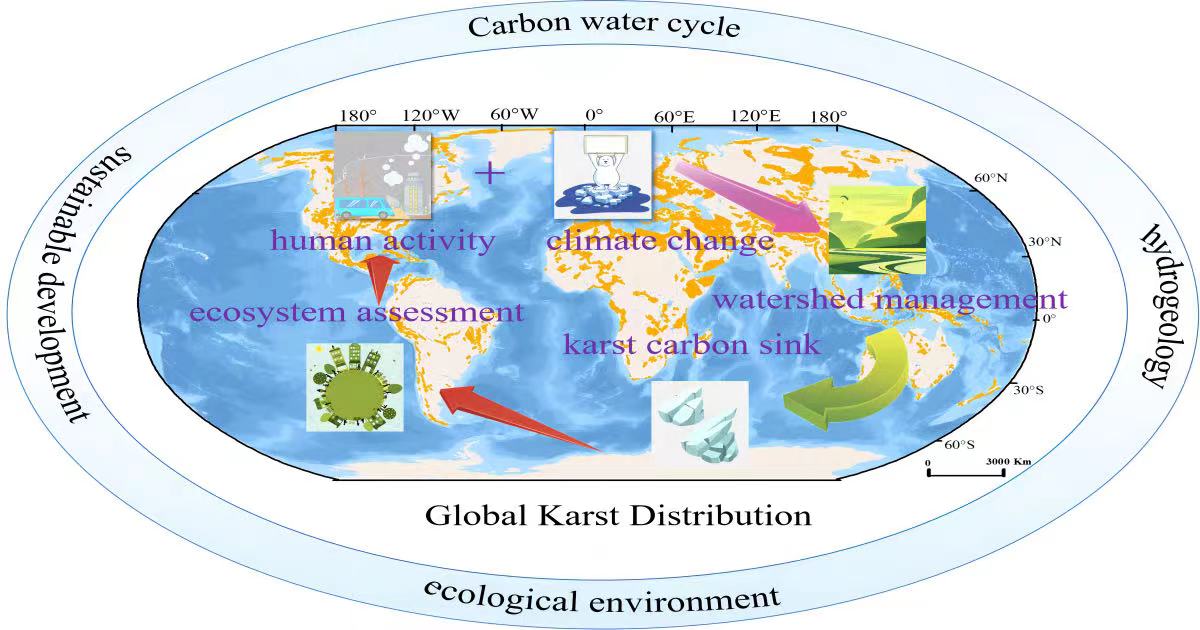Topic Editors






Karst Environment and Global Change—Second Edition

Topic Information
Dear Colleagues,
We are pleased to announce a Topic titled “Karst Environment and Global Change—Second Edition”. Karst areas are some of the world’s major ecologically fragile zones, accounting for 12% of the global land area and affecting the productive lives of 1.8 billion people. In particular, the East Asian karst region, centered on the Guizhou Plateau, is the largest and most concentrated contiguous ecologically fragile area in the world, covering an area of over 550,000 square kilometers, and is also the one with the most typical and complex karst development as well as the richest landscape types. The special ecological environment has multifaceted effects on natural, economic, and social development: on the one hand, karst regions are rich in mineral and medicinal resources; on the other, due to the special karst geological background, coupled with the increasingly harsh human–land conflict relationship, they are increasingly affected by the interaction of multiple layers from the lithosphere, atmosphere, hydrosphere, and biosphere. As a result, ecological problems, such as rock desertification, heavy metal pollution, diminishing biodiversity, and the irrational exploitation of mineral as well as medicinal resources, have emerged. At the same time, the Earth has experienced dramatic climate change in recent years, which may have a significant impact on karst ecological patterns, service functions, and sustainable development. However, uncertainties remain about the variability of karst environments and how they will respond to global change. Therefore, the aim of this topic is to discuss cutting-edge and hot issues, new techniques and methods, and new findings in this field on the topic of karst environments and global change, including various formats such as reviews, research papers, and datasets; contributions from experts and scholars in related fields are also welcome. Original research articles and reviews are welcome. Research areas may include (but are not limited to) the following:
- Karst ecosystem assessment (including stone desertification, soil erosion, soil formation rates, etc.);
- Carbon cycling, storage, and sinks in karst ecosystems;
- Biodiversity, ecosystem processes, ecosystem services, and climate change;
- Spatial and temporal dynamics of vegetation (productivity, greenness, vegetation cover, leaf area index, phenology, etc.) in response to climate change and human activities;
- Carbon sequestration, carbon emissions, carbon efficiency, and low-carbon mitigation policies in karst ecosystems.
Prof. Dr. Xiaoyong Bai
Prof. Dr. Yongjun Jiang
Prof. Dr. Jian Ni
Prof. Dr. Xubo Gao
Prof. Dr. Yuemin Yue
Prof. Dr. Jiangbo Gao
Prof. Dr. Junbing Pu
Dr. Hu Ding
Dr. Qiong Xiao
Prof. Dr. Zhicai Zhang
Topic Editors
Keywords
- karst
- ecosystem services
- soil erosion
- environmental remote sensing
- ecological restoration
- climate change
- carbon sink
- ecotoxicology and risk assessment
- geochemistry
- soil organic carbon
- ecosystem assessment
- global change
- human activity
- watershed management
Participating Journals
| Journal Name | Impact Factor | CiteScore | Launched Year | First Decision (median) | APC | |
|---|---|---|---|---|---|---|

Atmosphere
|
2.3 | 4.9 | 2010 | 16.9 Days | CHF 2400 | Submit |

Forests
|
2.5 | 4.6 | 2010 | 17.1 Days | CHF 2600 | Submit |

Geosciences
|
2.1 | 5.1 | 2011 | 23.4 Days | CHF 1800 | Submit |

Hydrology
|
3.2 | 5.9 | 2014 | 15.7 Days | CHF 1800 | Submit |

Land
|
3.2 | 5.9 | 2012 | 16 Days | CHF 2600 | Submit |

Remote Sensing
|
4.1 | 8.6 | 2009 | 24.9 Days | CHF 2700 | Submit |

Sustainability
|
3.3 | 7.7 | 2009 | 19.3 Days | CHF 2400 | Submit |

Preprints.org is a multidisciplinary platform offering a preprint service designed to facilitate the early sharing of your research. It supports and empowers your research journey from the very beginning.
MDPI Topics is collaborating with Preprints.org and has established a direct connection between MDPI journals and the platform. Authors are encouraged to take advantage of this opportunity by posting their preprints at Preprints.org prior to publication:
- Share your research immediately: disseminate your ideas prior to publication and establish priority for your work.
- Safeguard your intellectual contribution: Protect your ideas with a time-stamped preprint that serves as proof of your research timeline.
- Boost visibility and impact: Increase the reach and influence of your research by making it accessible to a global audience.
- Gain early feedback: Receive valuable input and insights from peers before submitting to a journal.
- Ensure broad indexing: Web of Science (Preprint Citation Index), Google Scholar, Crossref, SHARE, PrePubMed, Scilit and Europe PMC.
Related Topic
- Karst Environment and Global Change (19 articles)


